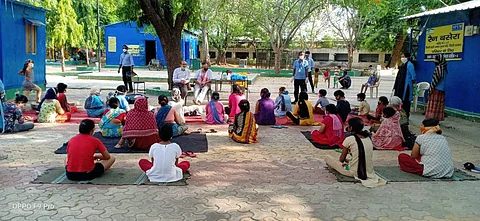

The Coronavirus pandemic has brought the whole world under quarantine and forced country-wide lockdowns in almost all the large economies of the world. While the strict imposition of the lockdown in India was necessary to contain the spread, it has also caused a life-threatening crisis for India's most vulnerable. Millions of daily wage and migrant labourers have lost their livelihoods, resulting in severe financial and social stress for them. Around 62 million people are broadly engaged as domestic help, in construction work, transport services and waste-picking in urban India, whereas in rural areas, they are engaged as small farmers and farm labourers. "Most of them get about Rs 1,000 a day. A large number of them get only about ten days of work in a month. This population is the most marginalised and that is the reality. Because of the lockdown, even if there is work, they are not allowed to. So they are stranded without food, money or shelter," explains Dr Rajesh Kumar, Executive Director, Society for Promotion of Youth and Masses (SPYM).
SPYM manages about 80 shelters with about 2,500 residents in Delhi, so when the lockdown was announced, the authorities had to come up with a quick plan on how to protect the people in their care. "We bought lots of material, about 30,000 kgs of rice, onions, potatoes and other vegetables. We also approached the Delhi government and they issued an order to support us," says Dr Rajesh. However, just a day later, they started getting a lot of new people because trains and buses were stopped. People started coming in huge numbers because they were the only ones providing free food. "We approached the Delhi government again. By April 25, we were in big crisis. We had around 30,000 people in our care. But we managed to get monetary support from the government. We upgraded our infrastructure and established new kitchens. Now we are serving them breakfast, lunch and dinner every day," says Dr Rajesh. Among the people who arrived at the shelter after losing their jobs, many had volunteered to help, especially those who could cook, thereby, making the huge task manageable.
Once Rajesh and his team were able to handle the food and shelter crisis, it was time to think about the next step -- being prepared for community spread. Even countries with the biggest health infrastructures like USA and Italy are overwhelmed because of the outpour of active COVID-19 cases. So it was obvious that if the number of cases in India keep increasing exponentially, it would be almost impossible for the poor to access medical care.
With this in mind and to be prepared in case such a situation arises, SPYM started taking efforts to build community resilience among the most vulnerable. They have begun training large number of community volunteers to face this pandemic in a more systematic and effective manner with its Community Volunteers for Critical Care campaign.
What does the programme entail?
Critical care is understood as very high-tech ICU-based care by highly trained professionals. It is indeed not possible to provide that level of medical care to large masses. However, modern health science also has lifesaving techniques and tools which can be rapidly deployed into the community with short term training to the community volunteers.
SPYM is preparing Critical Care Volunteers who could become the frontline warriors to face the impending crisis at community level before the arrival of professional health professionals. They can also play very important role if the pandemic actually becomes overwhelming to the capacities of professional health system.
Training these volunteers would help in myth busting, motivation, early identification of mental health/social health crisis and prevention and management before the professional help arrives, sanitation and sterilisation at community level, pre-hospital/pre-ambulance care of critical cases of COVID-19 or other life-threatening emergencies and training of manual BVM (AMBU) to be used while waiting availability of proper ventilators. Dr Rajesh adds, "We are training 10 people in each shelter, those who have leadership qualities and can manage people. It has instilled a confidence in the community that they can handle it. These leaders will also be responsible to ensure that no one gets out of the shelters. We can guarantee that as long as they are in, they will be safe. Once they are exposed, it will be very difficult because their immunity is already very low and a lot of them have pre-existing conditions like asthma and diabetes."
SPYM is also providing a ‘Community Based Critical Care Kit’ for the volunteers to effectively act at the time of crisis. The kit will be equipped with following items -- Complete Personal Protective Equipment (PPE) and body protection suits, first aid kit with BVM (AMBU) units, Sodium Hypochlorite solution for sanitation and sterilisation for critical cases and mist spraying bottles. The leaders are also taught how to handle dead bodies.
SPYM has successfully trained around 200 leaders by now and hopes to train about 1,500 leaders in total in the coming days.
